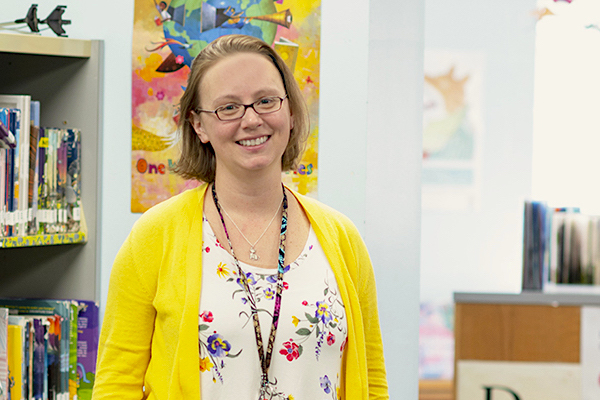“I have the best job in the whole world. I’m thankful for the professors who shared their expertise on best practices, for my mentors that coached me to get better and more confident in my knowledge and skill, and for my fellow students who helped create a learning community. UVM’s program was designed to help anyone achieve their learning goals." --Emily Wood, School Librarian at Richmond Elementary School
School Libraries in the Digital Age: Dynamic Hubs for Learning
The contemporary school library is designed as a space to transform learning and to encourage learners to think, create, share, and grow. Along with being physical space with resources in many formats, it is also a virtual space with access to databases, reading recommendations, and project and homework help. School librarians, also known as school library media specialists, are educational leaders and resource specialists in pre-K-12 schools who work collaboratively to provide equitable access to resources and information for all learners.
Online Coursework
Our School Library Media Science courses are delivered using a combination of asynchronous online work and opportunities to engage in a professional learning community through synchronous sessions. The specialization includes six graduate-level courses designed for both those with and without teacher certification (non-educators may need additional coursework). All of the courses are embedded in a strand of our Master of Education (M.Ed.) in Curriculum and Instruction.
Our curriculum addresses the essential competencies for School Library Media Specialists required by the State of Vermont. Courses reflect current standards for school librarianship as described by the American Association for School Librarians (AASL), the National Board for Professional Teaching Standards (NBPTS), and Vermont Standards for Educators.
Licensing for School Library Media Specialists
Upon successful completion of the program, qualified individuals may request a transcript review by the Vermont Agency of Education. While the specialization originated with practicing educators in mind, it is not just for teachers. For those seeking to change careers, the school librarian endorsement also has an option for non-educators to enter the profession through transcript review for initial certification.
All participants are encouraged to review the requirements for Vermont Educator Licensure through Transcript Review. For questions email the Licensing Helpline or call (802) 828-3440.


